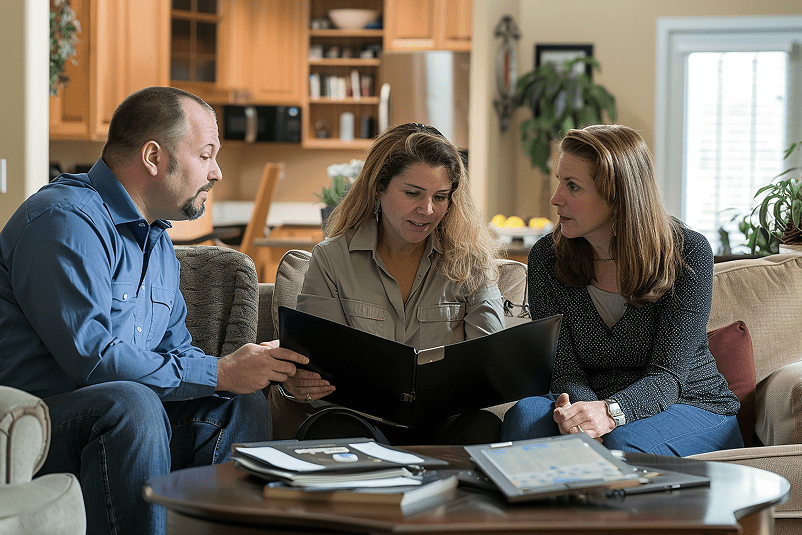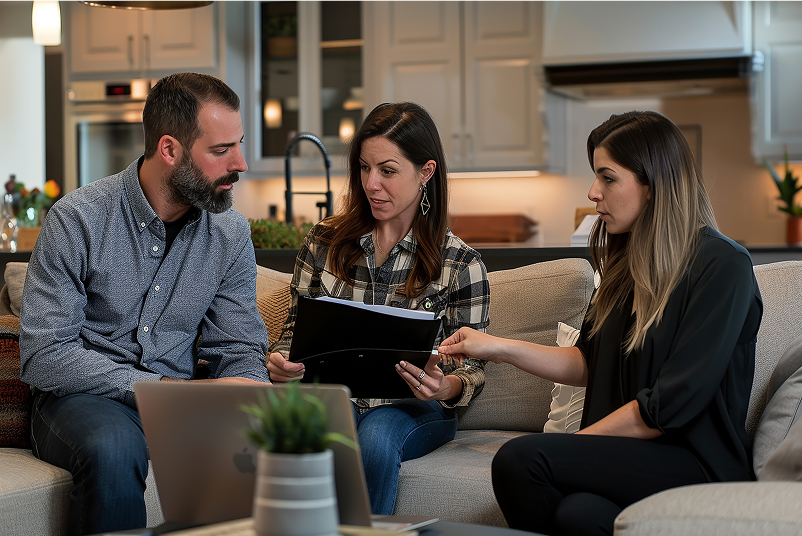Mortgages for Discharged Bankrupts
For individuals who have been through bankruptcy, the prospect of securing a mortgage can seem daunting. However, being a discharged bankrupt doesn’t mean the dream of homeownership is out of reach. With the right approach, and working with a experienced bad credit mortgage broker by working with and who understand your situation, you can still qualify for a mortgage after bankruptcy.
In this article, we’ll explore how discharged bankrupts can apply for a mortgage, what lenders look for, and which lenders are more willing to offer mortgages for bankrupts.
What Does It Mean to Be a Discharged Bankrupt?
Being discharged from bankruptcy means you are no longer legally required to pay the debts that were included in your bankruptcy. In the UK, bankruptcy typically lasts for 12 months, after which you’re discharged, and your financial situation begins to normalise.
However, the bankruptcy record remains on your credit report for six years from the date it was declared, which can make getting credit, including mortgages, more difficult.
Can You Get a Mortgage After Bankruptcy?
Yes, it is possible to get a mortgage after bankruptcy, but it can be more challenging. Most high street lenders may be reluctant to approve an application from someone who has recently been discharged from bankruptcy. This is because getting a mortgage after bankruptcy is more difficult due to the perceived higher risk associated with applicants who have a history of financial difficulties.
However, some specialist mortgage lenders are more flexible and willing to consider your application, depending on the specifics of your financial situation. All application will be subject to underwriters discretion.
Factors That Affect Your Mortgage Application as a Discharged Bankrupt
When applying for a mortgage after bankruptcy, lenders will evaluate several key factors:
1. Time Since Discharge
The longer it has been since your bankruptcy discharge, the more likely you are to qualify for a mortgage. Many lenders will consider applications from discharged bankrupts after a certain amount of time has passed, typically between 1 and 6 years. Some specialist lenders may offer mortgages even sooner, with a few even willing to consider applications on the first day after a discharge of bankruptcy, but the interest rates will generally be higher.
2. Credit Score
Your credit score will have taken a hit due to the bankruptcy, but demonstrating responsible financial behaviour since discharge can help improve it over time. Lenders will assess your current credit history, including whether you’ve kept up with other credit commitments since your bankruptcy.
Credit Reference Agencies
The most popular credit reference agencies that lenders use are as follows:
Experian
Equifax
Transunion
Checkmyfile combines all these credit reports together. This gives a specialist mortgage advisor everything they need to see when looking for potential lenders and finding the right mortgage.
3. Deposit Size
Lenders often require a larger deposit from discharged bankrupts, as this reduces their risk. While a typical mortgage may only require a 5-10% deposit, individuals with bad credit or a bankruptcy may need to provide a deposit of at least 15-25%. A larger deposit can also help you secure a more favourable interest rate.
4. Affordability and Financial Stability
Your income and overall financial stability will be critical in determining whether you qualify for a mortgage. Lenders will closely examine your ability to afford monthly payments, so demonstrating a stable income and controlled outgoings is essential.
Current employment stability is often required by lenders for discharged bankrupts, as it provides assurance of consistent income to meet mortgage obligations.
5. Other Credit Issues
If you have other bad credit history, such as defaults, missed payments, or County Court Judgments (CCJs) since your bankruptcy, it may further impact your chances of approval.
Most mainstream lenders will turn down mortgage applications from discharged bankrupts due to lack of flexibility. However, some lenders will still consider applicants with multiple credit issues if they can show improvements in financial management.
Specialised advice on bad credit mortgages can help you understand the various lending options available and the criteria lenders might impose based on the duration since your bankruptcy discharge.
What Do Lenders Look for in a Discharged Bankrupt?
While most high street lenders will be cautious about offering mortgages to discharged bankrupts, there are a number of specialist lenders who understand that past credit issues don’t necessarily indicate current financial irresponsibility.
Here’s what lenders typically look for:
Time Since Discharge: A minimum of 1 year is often required, but 3-6 years post-bankruptcy offers better chances for approval.
Financial Conduct: Lenders want to see a clean credit history since your discharge, with no missed payments, defaults, or other credit issues.
Income Stability: You’ll need to show a steady income and ability to afford the mortgage repayments.
Equity or Deposit: Lenders will generally require a larger deposit to offset the risk, typically in the range of 15-25%.
High Street Lenders for Discharged Bankrupts
Many high street lenders shy away from offering mortgages to applicants with a history of bankruptcy. Below is a table showing how high street banks treat discharged bankruptcies and their eligibility criteria.
Lender | Minimum Time Since Discharge | Deposit Requirement | Maximum LTV | Additional Notes |
Nationwide | 3 years | 10–15% | Up to 90% | Requires approval from a senior underwriter; a clean credit history since discharge is essential. |
Metro Bank | 3 years | 15–20% | Up to 85% | Considers applications subject to credit scoring and underwriter assessments. |
Skipton Building Society | 4 years | 10–15% | Up to 90% | Typically requires referrals from trusted specialist mortgage brokers. |
Barclays | 6 years | 5–10% | Up to 95% | Only considers applications if the bankruptcy was registered at least six years ago and is no longer on the applicant’s credit reports. |
TSB | 3 years | 10–15% | Up to 90% | May consider applications with a clean credit history since discharge; criteria may vary. |
Suffolk Building Society | 3 years | 10–15% | Up to 90% | Considers applications post-discharge; specific criteria may apply. |
Family Building Society | 3 years | 10–15% | Up to 90% | Offers products for applicants with a history of bankruptcy, subject to individual assessment. |
What our customers say
Marlon
25 Apr 2025
Showing our favourite reviews

Always attentive, helpful and efficient
Jonathan, 27 Jan 2025

Best Mortgage Broker in the UK!
Liam, 26 Nov 2024

Ben was really helpful in helping me…
George, 28 Aug 2024
Specialist Lenders for Discharged Bankrupts.
Aldermore | 2 years | Up to 85% | 15%–25% | Full income verification | Tiered LTVs based on discharge timing (e.g. 2, 4, 6 years) |
|---|---|---|---|---|---|
Bluestone Mortgages | 1 year | Up to 85% | 15%–25% | Employed, self-employed & complex income | Accepts recent adverse credit including bankruptcy |
Foundation Home Loans | 3 years | Up to 85% | 15%+ | Evidence of stable income required | Typically for employed and self-employed; specialist in non-standard income |
Kensington Mortgages | 3 years | Up to 85% | 15%+ | Must pass affordability checks | Must be discharged at least 36 months; no active adverse credit |
Pepper Money | 3 years | Up to 85% | 15%–25% | Must demonstrate affordability | Accepts applicants discharged from bankruptcy 3+ years ago |
Precise Mortgages | 3 years | Up to 85% | 15%+ | Evidence of reliable income essential | Prefer discharged >36 months; no active unsecured arrears |
Shawbrook Bank | 3 years+ | Up to 75% | 25%+ | Strong income and security required | Mostly for BTL, but does consider complex residential cases on referral |
The Mortgage Lender | 3 years | Up to 85% | 15%+ | Standard income checks apply | Accepts complex income; no defaults/CCJs in last 24 months |
Together Money | 12 months | Up to 75% | 25%+ | Must show provable income | Flexible on credit but higher rates; property condition matters |
Vida Homeloans | 3 years | Up to 85% | 15%+ | Affordability and credit profile considered | Case-by-case basis for complex adverse; discharged >36 months preferred |
Steps to Improve Your Chances of Getting a Mortgage After Bankruptcy
Here are some tips to help you improve your chances of getting approved for a mortgage after bankruptcy:
1. Check Your Credit Report
Review your credit report to ensure all information is correct. If there are any errors, such as debts that should have been included in your bankruptcy but are still listed, get them corrected. Keeping an eye on your report will also help you understand where you stand with lenders.
2. Improve Your Credit Score
Work on improving your credit rating after your bankruptcy order by paying all bills on time, staying out of further debt, and keeping your credit utilisation low. Over time, these positive habits can help rebuild your credit profile.
3. Save for a Larger Deposit
A larger deposit can significantly increase your chances of getting a mortgage and improve the terms offered to you. Aim for a deposit of at least 15%, but the more you can save, the better your options will be.
4. Consult a Specialist Mortgage Broker
A specialist mortgage broker can help you find the most suitable lenders for your circumstances. They have access to a wider range of lenders, including those that aren’t available on the high street. Brokers can help match you with a lender that is more likely to approve your application.
5. Prepare Financial Documentation
Lenders will want to see evidence of your income and expenditure. Having your documents, such as payslips, bank statements, and other financial records, organised will help smooth the application process and demonstrate your financial stability.
Conclusion
While getting a mortgage after bankruptcy can be challenging, it’s certainly possible with the right approach. Many specialist lenders, such as Pepper Money, Aldermore, and Bluestone Mortgages, offer products specifically designed for discharged bankrupts.
By taking steps to prevent further credit issues and rebuild your credit, saving for a larger deposit, and working with a specialist mortgage broker, you can increase your chances of securing a mortgage after bankruptcy and start your journey towards homeownership.
Remember, patience and careful planning are key. While bankruptcy may have temporarily impacted your finances, it doesn’t have to hold you back from achieving your long-term goals.
Get help from an experienced mortgage broker.
You can speak to one of our specialist mortgage brokers who would be able to guide you through the process. They will advise if there is a lender available and the maximum loan amount based on your circumstances. We are a whole of market mortgage brokerage with access to all lenders. Call us on 01332 470400 or complete the form with your details for us to give you a call back.
Why Work with Option Finance for Bad Credit Mortgages?
At Option Finance, we specialise in mortgages for complex credit scenarios. Our team works with all major bad credit lenders and has access to exclusive deals that aren’t available on the high street.
Understanding one’s credit report from a credit reference agency can help in securing a mortgage.
Over 20 years of experience
Full market access to specialist lenders
Fast, honest, and personalised mortgage advice
Expert help with complex or recent credit issues
Showing our favourite reviews

Always attentive, helpful and efficient
Jonathan, 27 Jan 2025

Best Mortgage Broker in the UK!
Liam, 26 Nov 2024

Ben was really helpful in helping me…
George, 28 Aug 2024
FAQs
Can I get a mortgage after being discharged from bankruptcy?
Yes, it’s possible. While high street lenders may be hesitant, many specialist mortgage lenders consider applicants who have been discharged—even as early as day one after discharge. The longer it’s been since your bankruptcy, the better your chances—especially with a clean credit record and strong financial profile.
How long after bankruptcy can I apply for a mortgage?
Most lenders require a minimum of 12 months since discharge. That said, some specialist lenders will consider applicants immediately after discharge, though you may need a larger deposit and pay a higher interest rate. After 3–6 years, more lenders become available, and better rates are possible.
What deposit do I need for a mortgage after bankruptcy?
Expect to provide a deposit of 15–25%. This helps offset the lender’s risk and improves your chances of approval. The larger your deposit, the more favourable your terms may be—even with a history of bankruptcy.
Will my bankruptcy affect my credit score and mortgage options?
Yes. Bankruptcy significantly impacts your credit score and stays on your credit report for six years. However, your recent credit behaviour matters more over time. If you’ve demonstrated good financial management since your discharge, lenders may be more willing to approve your application.
Which lenders offer mortgages to discharged bankrupts?
Some high street lenders like Barclays, Metro Bank, and Nationwide may accept applicants after 3–6 years post-discharge. For more flexible terms, specialist lenders often provide tailored mortgages to discharged bankrupts with varying deposit requirements and LTVs. Option Finance can help match you to the right lender based on your unique profile.
Ready to Take the First Step?
Whether you’re a first-time buyer, remortgaging, or moving home, bad credit doesn’t have to hold you back.
Understanding credit scoring can help you prepare for a mortgage application. You can speak to one of our specialist mortgage brokers who would be able to guide you through the process. They will advise if there is a lender available and the maximum loan amount based on your circumstances. We are a whole of market mortgage brokerage with access to all lenders.































